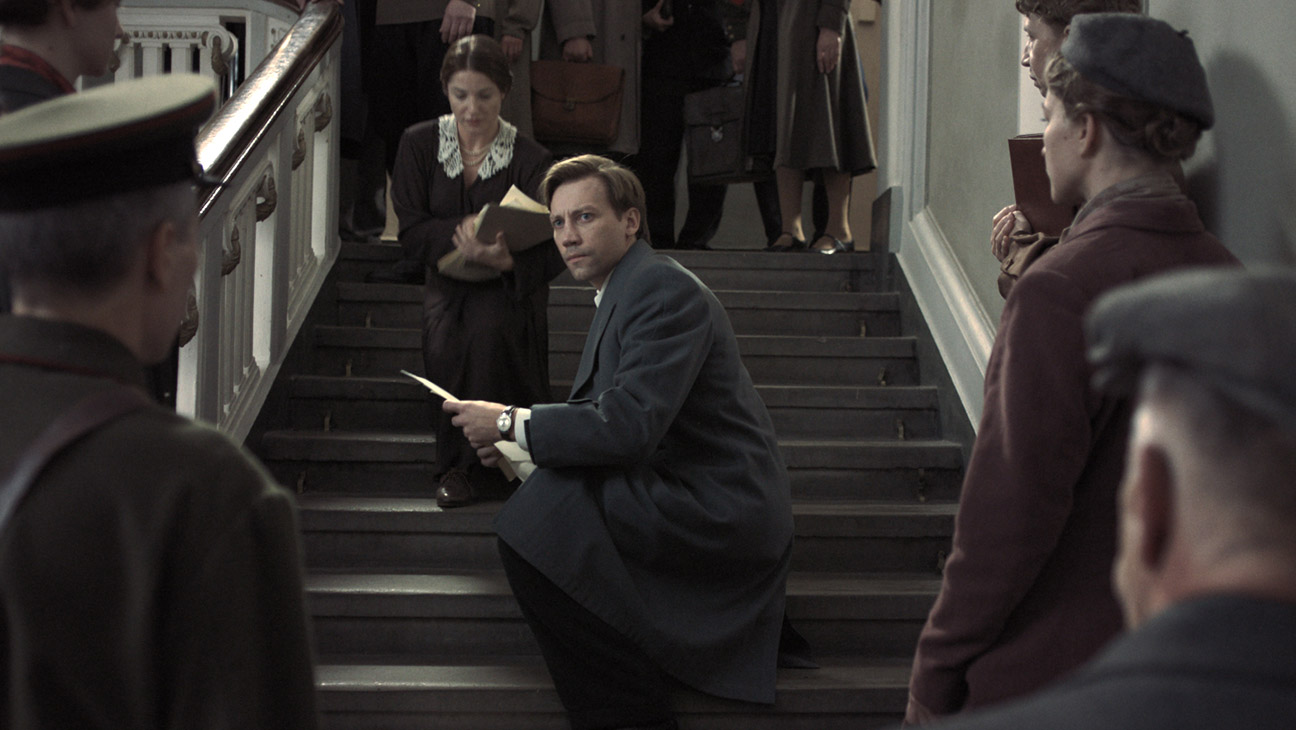You don’t need to wield a hammer and sickle to feel the weight of Soviet tyranny hanging over Two Prosecutors, a solemn Stalin-era drama from Sergei Loznitsa that doubles as a metaphor for the kind of oppression tormenting Russia right now.
Impeccably directed and impressively acted, this slow-burn story of political injustice is filled to the brim with atmosphere — specifically the stifling, claustrophobic atmosphere of the U.S.S.R. at the height of Stalin’s Great Purge. For those familiar with that period, nothing in the movie, which was adapted from a 1969 book by physicist and gulag survivor Georgy Demidov, may seem surprising. But this Cannes competition entry is more about the journey than the destination, revealing what it was like to live at a time when personal freedom was all but extinguished by rampant authoritarianism.
Two Prosecutors
The Bottom Line
Punishing but powerful.
Venue: Cannes Film Festival (Competition)
Cast: Alexander Kuznetsov, Aleksandr Filippenko, Anatoli Beliy, Andris Keiss, Vytautas Kaniusonis
Director, screenwriter: Sergei Loznitsa, based on the book by Georgy Demidov
1 hour 57 minutes
The first shot of the film is of a prison door opening and closing, and it’s a clear prelude to the rest of what happens in Loznitsa’s meticulously crafted narrative. Lensed by Oleg Mutu (4 Months, 3 Weeks and 2 Days) in the box-like 1:1.33 format, the movie was photographed in color but may as well have been made in black-and-white, so much does it depict a world without warmth or hope.
Loznitsa is certainly no stranger to such backdrops, exploring the bleaker sides of both Russia and his native Ukraine in a body of work that has seamlessly shifted between fiction (My Joy, In the Fog, Donbass) and documentary (Maidan, The Event, Babi Yar. Context). Two Prosecutors is perhaps his most austere film to date — controlled as tightly as the NKVD (Stalin’s secret police of the 1930s and 40s) controlled the Soviet people. It’s not always an easy sit, creeping along as it moves from one suffocating situation to another. But it gradually builds into a powerful statement on Russian tyranny both then and now.
A slow-burn opening shows prisoners being assembled in a courtyard. The year is 1937 and the men all look like they’ve been through hell. (Indeed, in the next scene one of them falls off a scaffolding and drops dead, his body quickly hauled away.) The oldest among them (Ivgeny Terletsky) is sent alone to a cell, where he’s tasked with burning the letters of fellow inmates. In what will be the first of many acts of courage against the powers-that-be, he decides to save one letter in which a prisoner claims he’s been unfairly jailed and asks for legal counsel.
The sequence is telling, underscoring the sheer impossibility of justice within a system that has been designed to quash resistance at all levels, from the very bottom to the top. This is the trajectory the film itself takes, gradually following the effects of that one authority-defying act from the bowels of a provincial prison all the way to one of the highest offices in Moscow.
Our guide through the crushing bureaucracy is a bold young prosecutor named Kornev (Alexander Kuznetsov), who receives the smuggled letter and shows up at the prison to deal with the situation. He faces hostility every step of the way, from an array of brutish guards to a dismissive warden (Vytautas Kaniusonis) who keeps trying to get rid of him, and finally to the U.S.S.R’s general prosecutor (Anatoli Beliy), who receives him in his office after the longest wait of all time.
What’s fascinating about Two Prosecutors is that nobody directly turns down Kornev, nor do they ever let him know what they’re really thinking. This is a world where everyone is so afraid that the slightest word or act could land them in jail, or possibly Siberia, that they’re constantly holding their tongues as they try to strategize their way through the system. New to the game of 4D Soviet chess under Stalin’s reign of terror, Kornev is the only person to truly speak his mind, and it’s no surprise what winds up happening to him as a result.
The irony is that Kornev thinks he’s saving the very Marxist revolution that the U.S.S.R. is meant to embody. The inmate who wrote the letter, Stepniak (Aleksandr Filippenko), is an old Bolshevik worker who was part of the 1917 uprising and has spent years in prison being tortured without reason. By trying to take a revolutionary hero’s case to the highest echelons of power, Kornev foolishly believes he’s fighting corruption in the regime he’s meant to serve.
The compelling Kuznetsov portrays the prosecutor as a wise and stubborn lawyer who’s also the last person to be in on the joke that was Communism under Stalin. This is most apparent in a late sequence — and probably the highlight of the movie — in which Kornev takes the train back from Moscow to his hometown of Briansk, riding along with two businessmen (Valentin Novopolskij, Dmitrij Denisiuk) who he suspects could be NKVD agents. After some hesitation, he decides to drink and be merry with them, enjoying an impromptu music performance as the train chugs along through the night, unaware of the fate already in store for him.
Loznitsa is much less of a dupe than the naïve young Korvev, and the director ultimately leaves the viewer back at the same prison door where his film began. The journey in Two Prosecutors is therefore a circular one — a long and winding round-trip between a rock and a hard place. This is what life was like in the U.S.S.R. at that time, and it’s no secret that life in Russia under Vladimir Putin is hardly different nowadays. Loznitsa is reflecting on the past here, but for anyone who cares to look, he’s holding a mirror up to the present.











